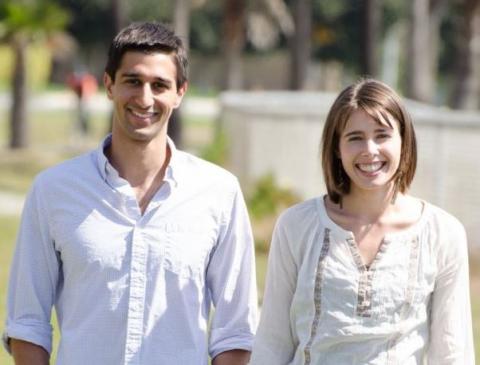CS PhD students receive prestigious NSF Fellowships

Congratulations to Computer Science PhD students Chris Sweeney and Morgan Vigil, who have been awarded National Science Foundation Graduate Research Fellowships. The Fellowships provide each student with a stipend of $30,000 a year for three years plus tuition and travel support.
Chris is a doctoral student in the Four Eyes Lab, where his research is focused on real-time localization from large-scale 3D datasets for use in augmented reality. Morgan is a doctoral student in the MOMENT Lab, where she is interested in utilizing resource efficient and culturally considerate connectivity solutions in rural areas.
Chris’ fellowship abstract:
Recent work in structure from motion (SfM) has successfully build 3D models of the physical world from massive image sets made available from internet collections such as Flickr. With geo-registered images from structured sources such as Google Street View, unstructured image sets can now be registered to exact 3D world coordinates. However, these models are not currently accessible for real-time, severely limiting their use in applications such as augmented reality (AR). Further, users of such an AR system should be able to enhance the experience for future users by contributing to such 3D models.
The proposed research builds upon current SfM and simultaneous localization and mapping methods, to create a real-time system that would bring a direct link between location-specific information and the physical world. The proposed research is a crucial step toward a globally accessible AR, that is, the ability to augment urban environments with location-specific information at any location in the world.
Morgan’s fellowship abstract:
Forging forward into the Information Age, we are more connected than ever before. In areas with well developed infrastructure, communities enjoy the educational, economic, health, and social benefits of broadband access. However, there is a “digital divide” separating affluent from underdeveloped communities. Rural developing areas in particular often lack the infrastructure that makes broadband services easily accessible.Tribal lands in particular face significant obstacles to broadband deployment. These obstacles include limited financial resources, a shortage of technically skilled Tribal members to undertake deployment and integration planning, a lack of commercial investment, and high buildout expenses.
Broadly, my research aims to overcome broadband deployment obstacles in developing regions that exhibit more spatially distributed communities. More specifically, my research pays special attention to facilitating access to online educational resources in developing regions, particularly Tribal lands. According to the FCC, broadband has the potential to improve education by providing access to high quality and current educational materials, increasing educational opportunities outside the classroom, creating customized learning opportunities, and increasing the contact between educators and students. In order for these educational resources to have relevance in the community, they must be presented in a manner consistent with community values. The proposed work builds upon VillageNet, a holistic connectivity prototyped by Prof. Belding. To this end, I propose facilitating access to educational resources via RemoteMath, a tutoring system that provides free tutoring services to remote students using VillageNet via GSM-to-IP connections. Additionally, I seek to create sustainable technical support built from local knowledge with CommunIT, a system supporting multicast media sharing between remote users and knowledge centers (e.g. libraries and schools). In addition to acting as a remote means of technical support, CommunIT supports FIRETALK, a mobile P2P system that promotes sharing and collection of indigenous knowledge.
She further comments on her proposed work:
Not only does the project focus on developing technical solutions, but it develops the solutions in a manner consistent to local perspectives on Internet technology. I am enthusiastic to work on a project that aims to enact social justice in a practical and sustainable manner and as I continue in my advanced degree, I hope to direct it toward solutions to the current digital divide found on Native American reservations.
Again, congratulations to Chris and Morgan for these well-deserved awards!